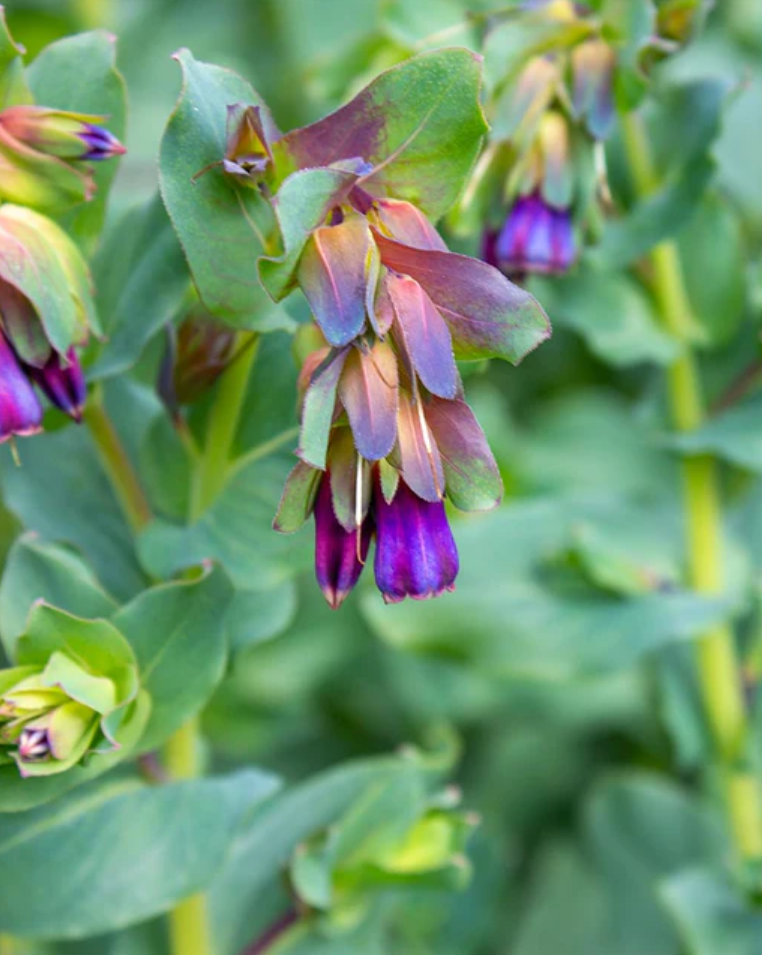Olive Seed Company
Cerinthe 'Kiwi Blue Honeywort'
Cerinthe 'Kiwi Blue Honeywort'
Couldn't load pickup availability
Kiwi Blue Honeywort (Cerinthe major purpurascens)
Kiwi Blue, also known as Honeywort, is a captivating annual that enchants with its cascading stems reaching up to 24" (60 cm) tall, adorned with nodding, tubular blue-purple flowers. Each bloom is framed by dusky blue bracts that deepen in tone as the season progresses, creating a layered, painterly effect in both gardens and floral arrangements. Its cool-toned foliage, silvery and eucalyptus-like, adds a soft, whimsical texture that complements pastel or vibrant planting palettes.
A magnet for bees and pollinators, Kiwi Blue provides abundant nectar from early summer into fall, supporting garden biodiversity. Easy to grow and drought-tolerant once established, it thrives in full sun and performs beautifully in beds, borders, or containers. Deer-resistant and endlessly charming, this Honeywort brings graceful movement, delicate colour, and effortless elegance to any garden or bouquet.
Details:
QTY: 50
TYPE: Annual
SITE: Full Sun
DEPTH: 1/4"
GERMINATION: 5-21 Days at 18-29°C - Soak seeds overnight
HEIGHT: 20 - 24”
MATURITY: 65 - 70 Days
SPACING: 12 - 18”
PINCH: No
HOW TO GROW:
Transplanting (recommended): Cerinthe is best started indoors and transplanted out, as it dislikes root disturbance once established. Start seeds 6 weeks before your last expected frost date. Sow seeds ¼" deep into individual cell packs or soil blocks to avoid root disruption later. Use a high-quality, well-draining seed-starting mix. A heat mat can help speed germination, which typically occurs in 7–21 days. Once seedlings are well-rooted and your outdoor temperatures are mild (after the last frost), harden them off over 5–7 days before transplanting into the garden.
Direct Seeding (alternative): Direct seeding is an optional method. Sow seeds ¼" deep after the danger of frost has passed and the soil has warmed. Sow seeds spaced 2–3" apart and thin to a final spacing of 12–18" apart once seedlings are large enough to handle. Direct seeding works, but germination is slower and less uniform than starting indoors. Seeds can also be fall-sown in mild winter regions for earlier blooms the following spring.
Pinching: Pinching is not necessary, as cerinthe naturally forms a pleasing shape. Deadheading can encourage more continuous flowering throughout the season.
Soil Preference and Watering: Cerinthe prefers full sun and well-drained soil. Water regularly to keep the soil consistently moist, especially during germination and establishment. Once mature, it is somewhat drought-tolerant.
Fertilizing: Fertilizing is not required for Cerinthe. It performs best in average to lean soil, and too much fertility can lead to weak, leggy growth.
Harvesting: Cerinthe is a great choice for bouquets, adding unique foliage and bell-shaped flowers. Harvest stems when they have a good length and the flowers are fully formed.
Shipping & Returns
Shipping & Returns

-
Free Shipping
Free Shipping on all orders in Canada over $125.00

